Repair help
Dishwasher Smell: Causes & How to Eliminate It in 5 Easy Steps
AZparts Team
Updated on July 11, 2025
8 min read
A lingering dishwasher smell can quickly take away the feeling of a clean kitchen. Whether it's a musty odor or the scent of old food, unpleasant smells often signal hidden buildup or drainage issues inside the appliance. Let’s explore the common causes of dishwasher smell and how to eliminate it in five simple steps with AZParts by your side.
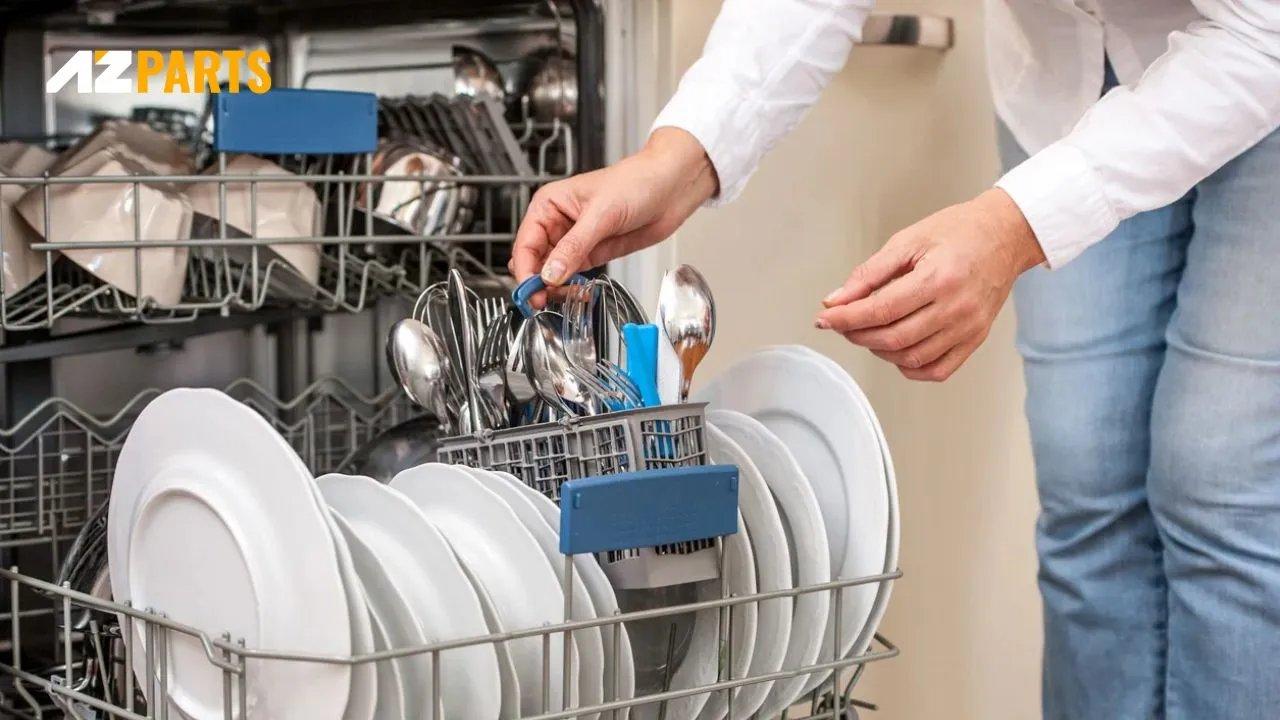
1. Why Does My Dishwasher Smell?
If your dishwasher smells unpleasant, the cause is often due to leftover food, grease buildup, drainage issues, or moisture. Identifying and addressing the source of the odor is the first step to restoring a fresh-smelling, properly functioning dishwasher. Below are the most common reasons your dishwasher may emit bad odors:
1.1. Dirty or clogged filter
A dirty or clogged filter is one of the most common reasons a dishwasher smells bad. Food debris can build up in the filter over time, leading to unpleasant odors and poor cleaning performance. You should regularly remove and clean the dishwasher filter according to your dishwasher’s manual. If your model has a maintenance-free filter, this is less likely to be the source of the smell.
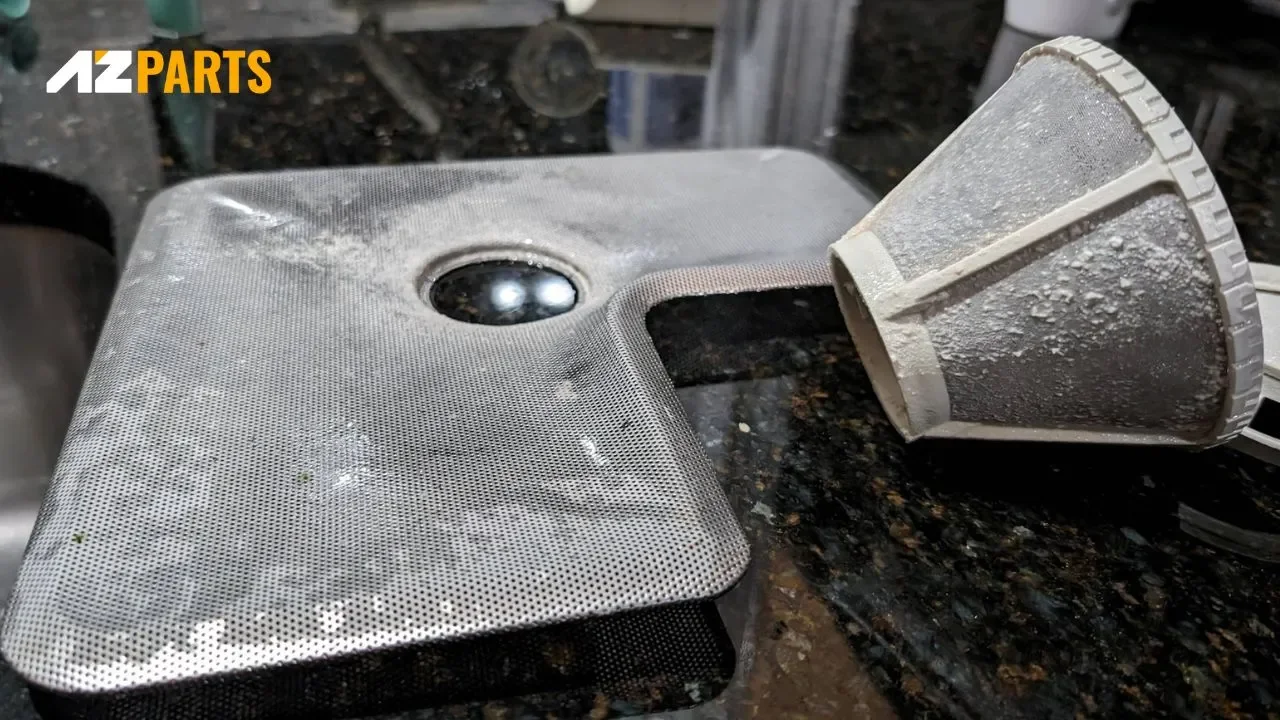
A dirty filter is one of the reasons a dishwasher smells bad (Source: AZParts)
1.2. Built-up food debris inside the tub
Leftover food particles often fall off dishes and settle inside the tub. If these food remnants are not cleaned out, they can cause your dishwasher to smell over time. You should scrape dishes before loading and remove any visible debris from the bottom of the tub. Running a rinse cycle and occasionally using a dishwasher cleaner or white vinegar can help keep the interior fresh.
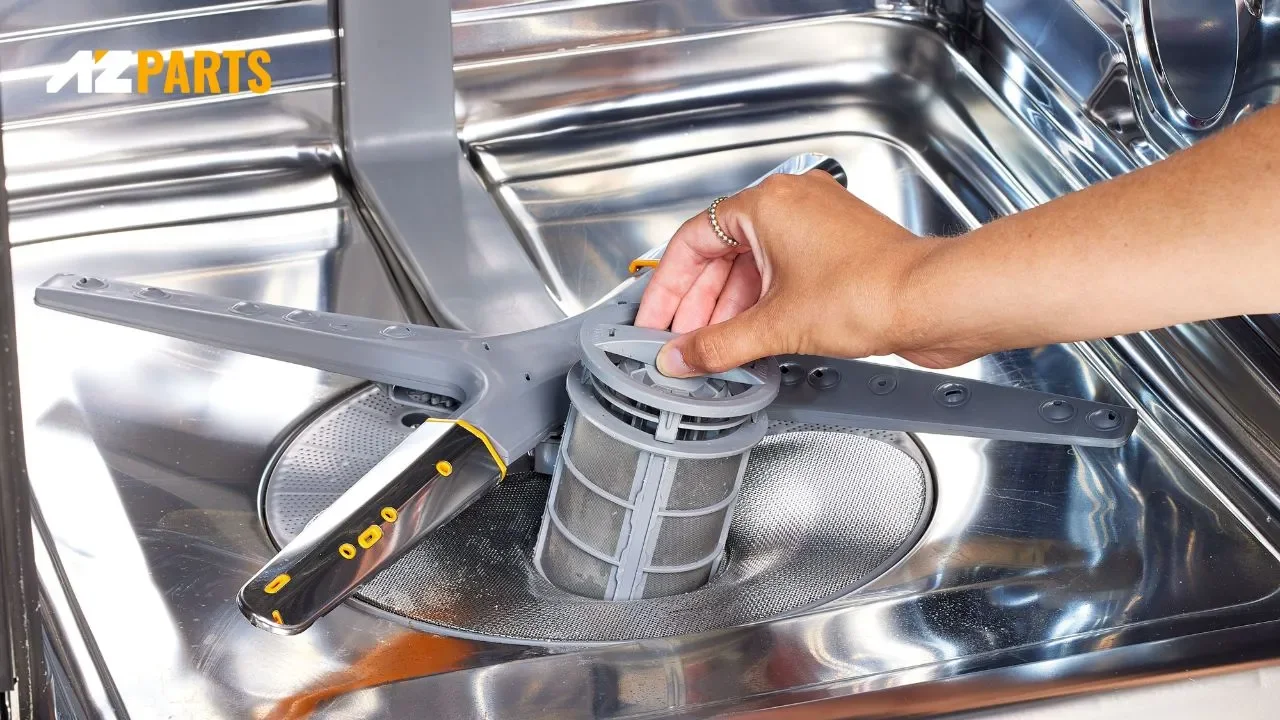
Leftover food can cause your dishwasher to smell over time (Source: AZParts)
1.3. Standing water or drain clogs
Standing water at the bottom of your dishwasher can cause a sewage-like odor and usually signals a drainage issue. You should check the drain for clogs and run a normal cycle to see if it drains completely. If your dishwasher is connected to a garbage disposal, ensure the disposal is not clogged and the knockout plug has been removed from the inlet. Cleaning the drain basket may also help improve drainage.
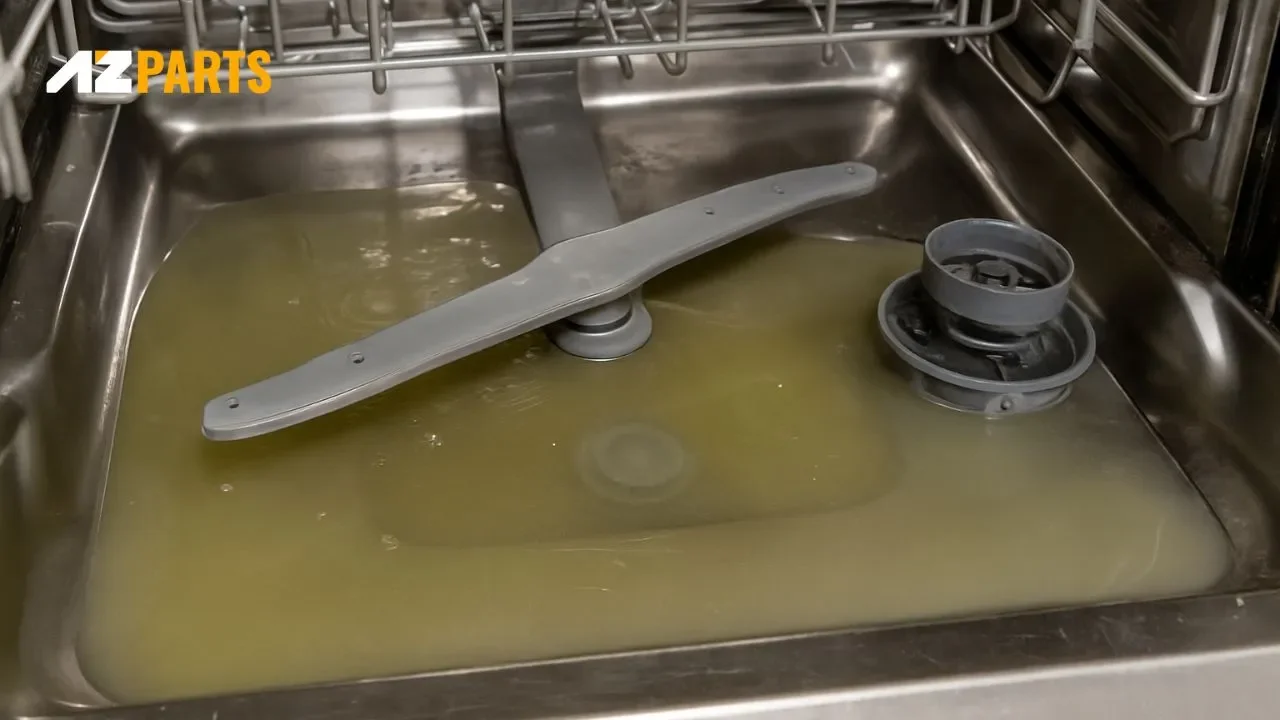
Standing water at the bottom of your dishwasher can cause a sewage like odor (Source: AZParts)
1.4. Mold or mildew on door seals
The warm, moist environment inside a dishwasher can promote the growth of mold or mildew, especially around the rubber dishwasher gasket seal on the door. If your dishwasher smells musty, you should wipe the door seals with a damp cloth and a mild cleaner to remove visible buildup. Leaving the door slightly ajar after each cycle can help dry out the interior and reduce mold growth.
_1752206508.webp)
Mold growth causes dishwasher odor (Source: AZParts)
1.5. Grease or soap scum buildup
Grease and soap residue can accumulate in various parts of the dishwasher, including the filter, spray arms, and inner walls. Over time, this buildup can cause strong, unpleasant odors. You should clean the interior of the dishwasher regularly with a recommended dishwasher cleaner and ensure the filter is clear of grease.
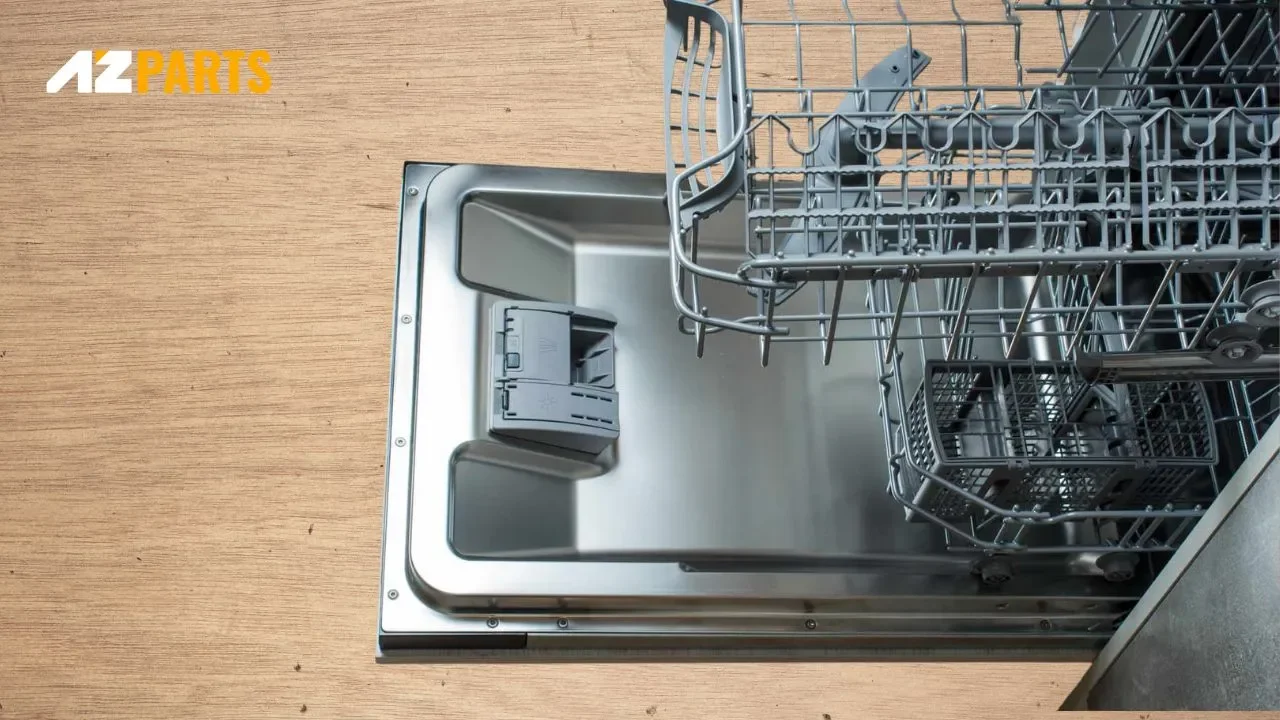
Over time, this buildup can cause strong, unpleasant odors (Source: AZParts)
1.6. Burning plastic (when plastic items touch heating elements)
If you smell burning plastic after a cycle, it may be because a plastic item touched the heating element during the drying process. This can happen if lightweight plastic containers fall through the rack or are improperly placed. You should inspect the bottom of the dishwasher for melted plastic and avoid placing plastic items near the heating element in future cycles.
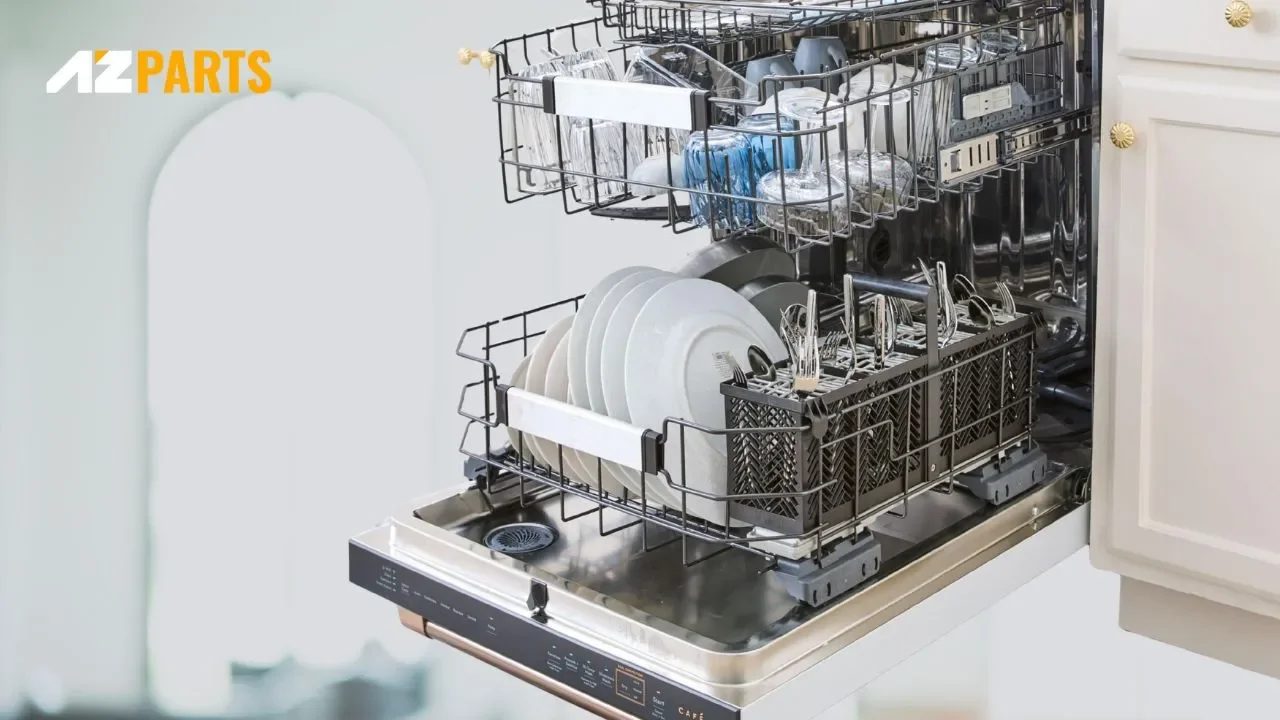
If there is a burning plastic smell, it may be due to a plastic item touching the heating element (Source: AZParts)
2. How to Get Rid of Dishwasher Smells: Step-by-Step
If your dishwasher has started to emit unpleasant odors, you can follow these practical steps to clean and refresh it. Each step focuses on removing the source of the smell and improving your dishwasher’s performance.
2.1. Step 1: Empty the Dishwasher
You should begin by removing all dishes, glassware, and utensils from the dishwasher. Clearing out the interior gives you full access to clean every part of the appliance thoroughly. Make sure the dishwasher is completely empty before moving on to the next step.
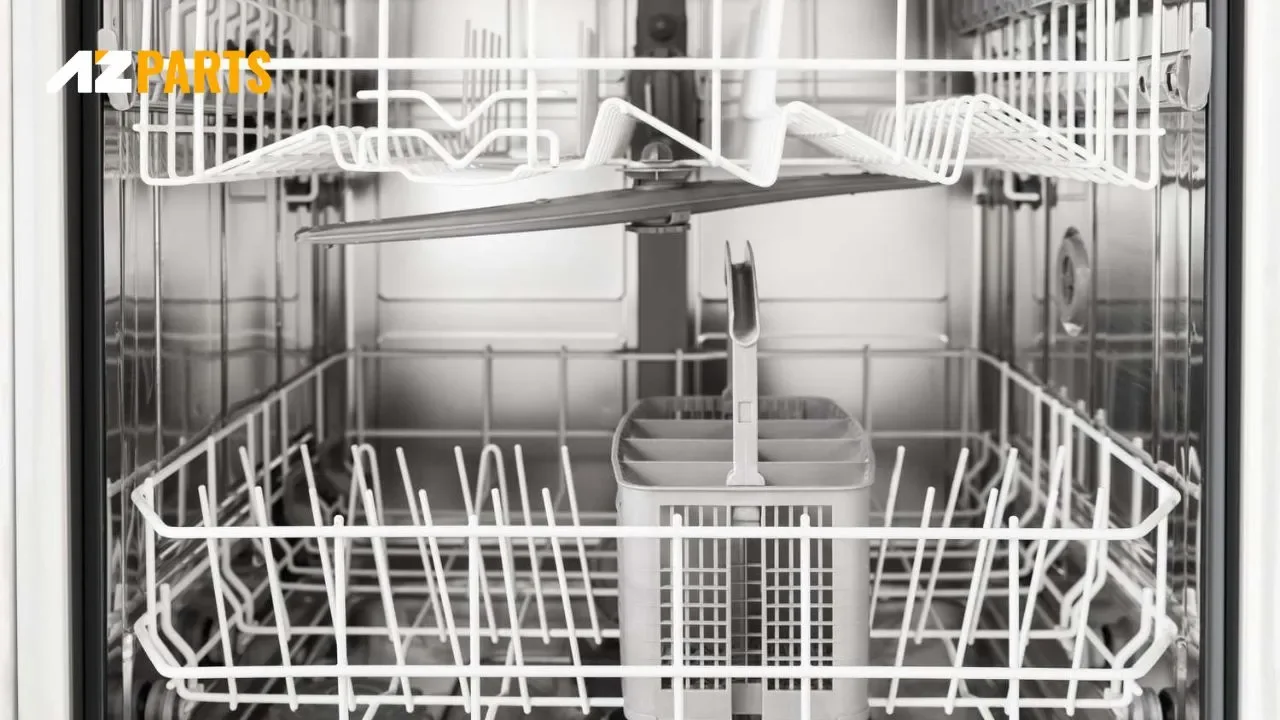
You should begin by removing all from the dishwasher (Source: AZParts)
2.2. Step 2: Remove and Clean the Filter
You should pull out the bottom dish rack and locate the filter, usually found beneath the lower spray arm. Before removing the filter, consult your dishwasher’s user manual for model-specific instructions. After removing the filter, rinse it under warm water and soak it in soapy water to loosen any stuck debris. Use a soft-bristled brush to scrub away any stubborn particles. After cleaning, you should reinstall the filter securely.

Rinse the filter under warm water and soak it in soapy water (Source: AZParts)
2.3. Step 3: Clean the Dishwasher Interior
To clean the interior, you should pour about two cups of white vinegar into a dishwasher-safe bowl or container. Place it on the bottom rack of the empty dishwasher. Run a full cycle using the air-dry or energy-saving dry option. During the cycle, the vinegar will help dissolve grease, neutralize odors, and disinfect the interior surfaces. After the cycle is complete, you can wipe down any remaining spots manually if needed.
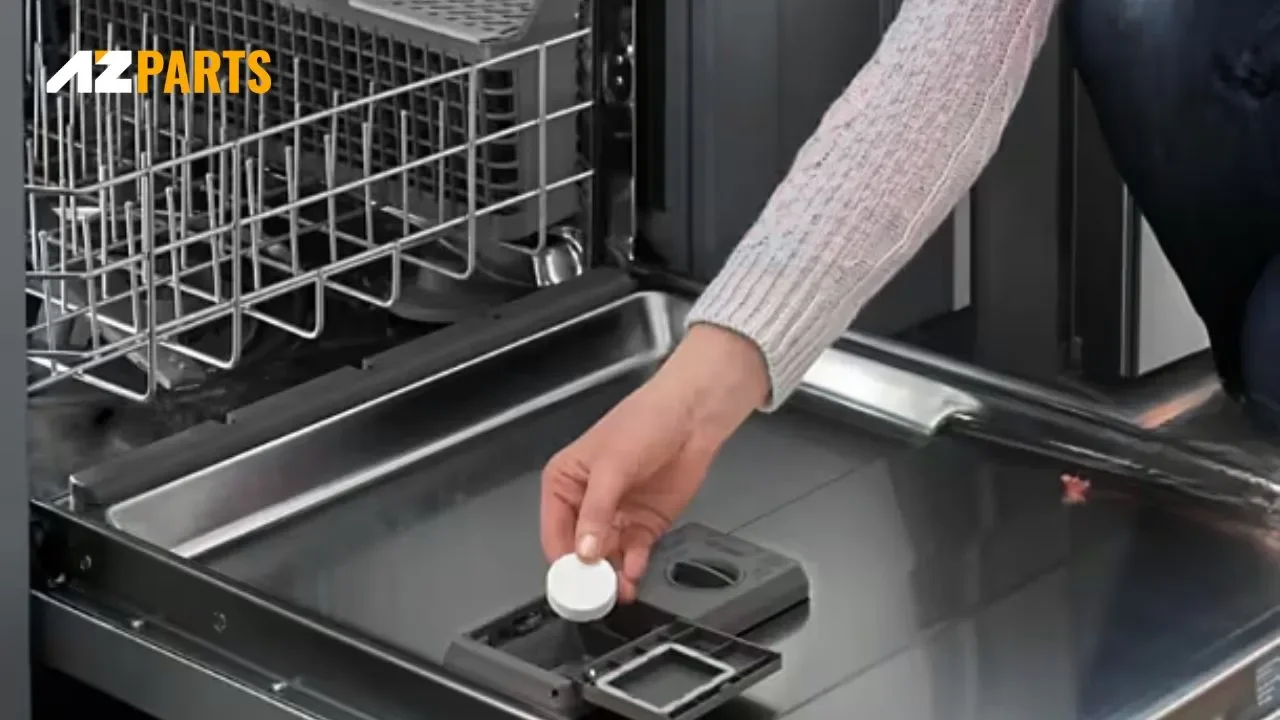
Next, you need to clean the dishwasher interior (Source: AZParts)
2.4. Step 4: Clean the Gasket and Door Seals
The rubber gasket and door seals can trap moisture and food particles, leading to mold or mildew. You should use a sponge dipped in warm, soapy water to gently wipe around the edges of the door and inside the folds of the gasket. Pay close attention to crevices where grime can accumulate. After cleaning, you should dry the area thoroughly with a clean towel to prevent further moisture buildup.
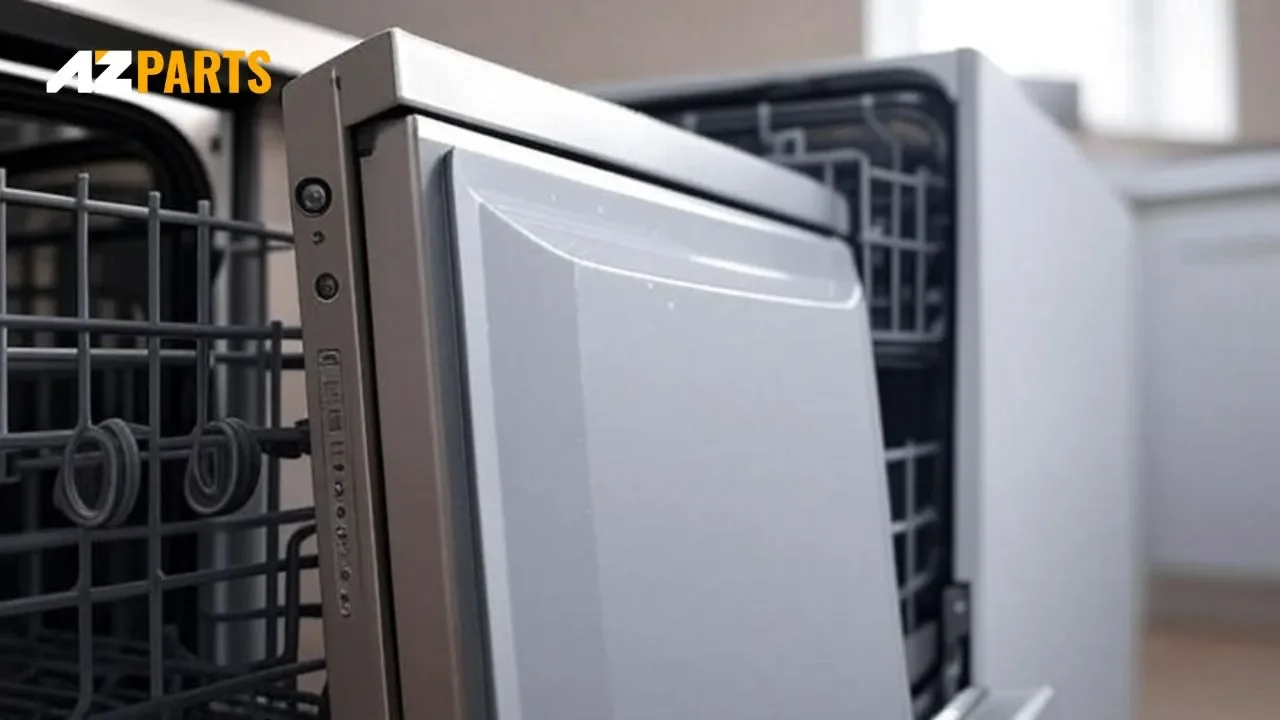
You should use a sponge dipped to gently wipe around the edges of the door (Source: AZParts)
2.5. Step 5: Deodorize with Vinegar or a Dishwasher Cleaner
If odors persist, you can repeat the vinegar rinse or use a specially formulated dishwasher cleaner. These cleaners are designed to break down mineral deposits, grease, and lingering smells. You should follow the product’s instructions carefully to ensure safe and effective use. Regular use of these products can help maintain a fresh-smelling dishwasher over time.
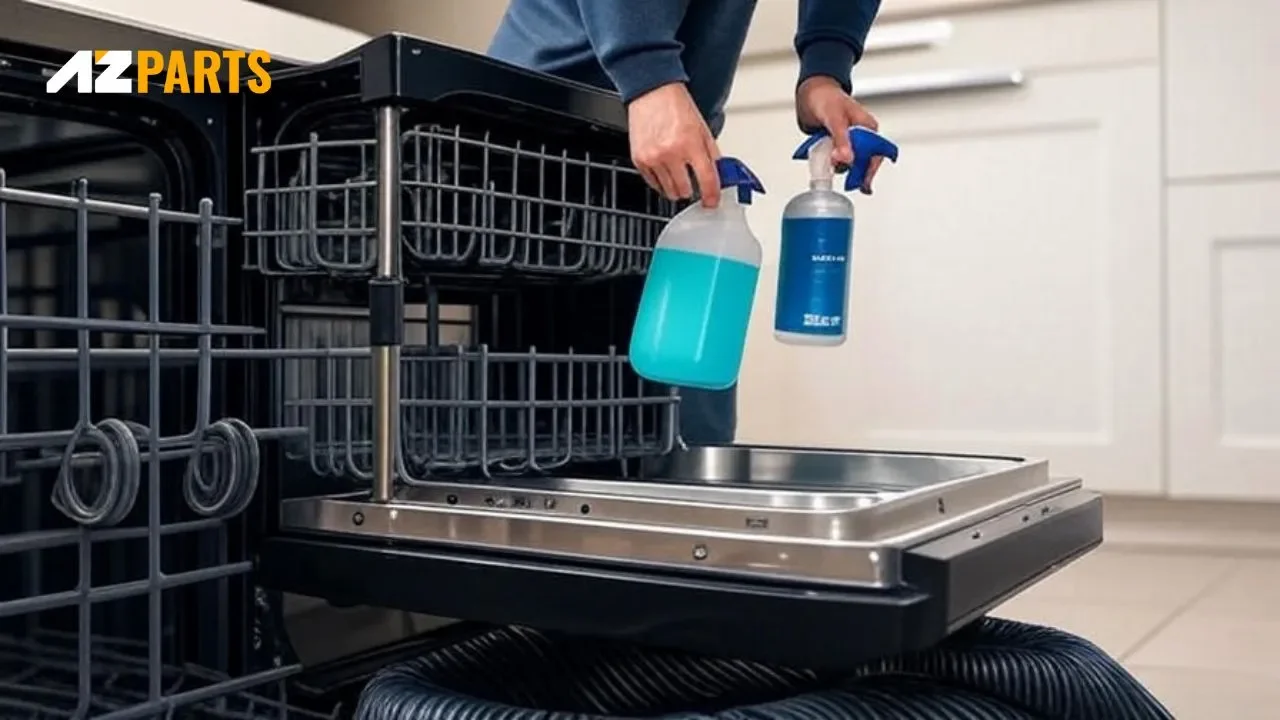
Regular use vinegar or a dishwasher cleaner can help maintain a fresh smelling (Source: AZParts)
3. How to Prevent Dishwasher Odors
To prevent unpleasant odors from developing in your dishwasher, you should follow a few simple maintenance habits that keep the appliance clean and working efficiently.
First, you should clean the dishwasher filter regularly. The filter traps food particles that can rot over time and produce foul smells. By rinsing and scrubbing the filter frequently, you can prevent buildup and ensure better water flow during wash cycles.
Second, you should avoid overloading the dishwasher. When the racks are packed too tightly, water and detergent cannot circulate properly. This can leave food residue on dishes and inside the appliance, leading to unpleasant odors. Make sure to load dishes in a way that allows enough space for thorough cleaning.
Next, you should clean the interior of the dishwasher regularly to remove any hidden food debris or grease. Wiping down the walls, door seals, and spray arms can help keep the appliance fresh and odor free.
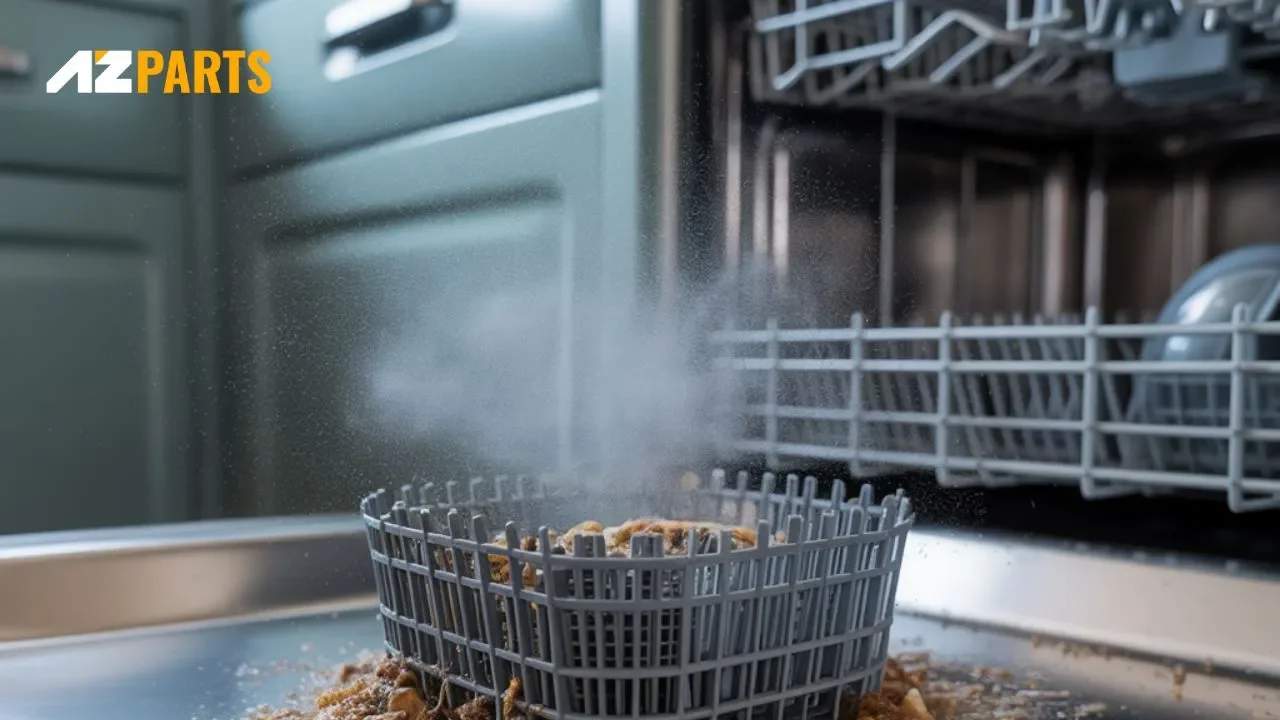
You should clean the dishwasher filter regularly to prevent unpleasant odors (Source: AZParts)
4. FAQs About Dishwasher Odors
4.1. How often should I clean my dishwasher?
You should clean your dishwasher at least once a month to prevent food buildup, grease, and odors. This includes wiping down the interior, cleaning the filter, and checking the spray arms and drain area for any trapped debris.
4.2. Can I use bleach to clean my dishwasher?
You can use bleach to clean your dishwasher only if it is not a stainless steel model. Bleach can corrode stainless steel and damage parts of the appliance. For general cleaning, it is safer to use vinegar or baking soda. Always consult your user manual before using bleach.
4.3. Why does my dishwasher smell like burning plastic?
If your dishwasher smells like burning plastic, it’s likely that a plastic item has fallen onto the heating element during a cycle. You should check the bottom of the dishwasher for any melted pieces and remove them carefully once the appliance has cooled. If the smell persists, you may need to inspect the heating element for damage.
A clean, odor-free dishwasher not only improves your kitchen environment but also ensures better performance and hygiene. By following the steps above and practicing routine maintenance, you can prevent odors from returning. If your dishwasher needs replacement dishwasher parts like a new filter or drain hose, explore reliable options available at AZParts to restore your appliance with confidence.
Contact Information:
8 The Green, Ste A, Dover, Delaware 19901-3618, United States
Learn more about how to repair and clean your dishwasher properly:
Dishwasher
Further Reading
Further Reading

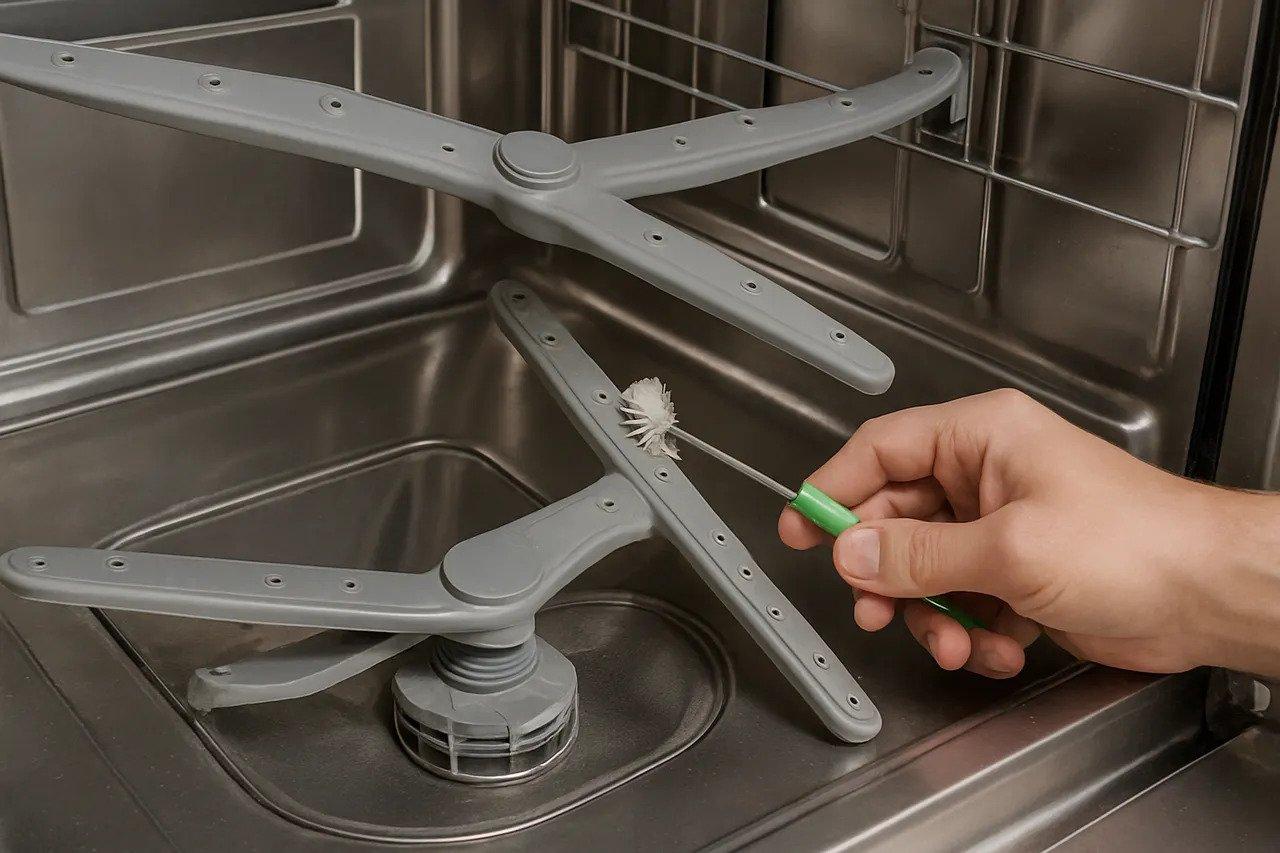

_1748246700.jpg&w=3840&q=75)

